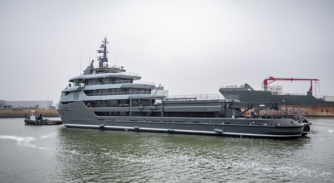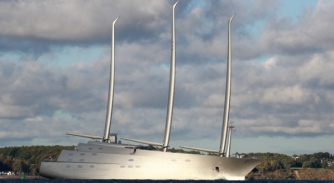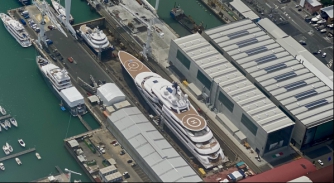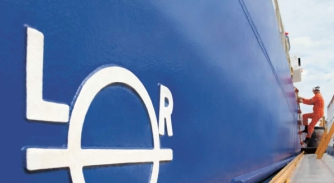Where next?
With flag and class de-registering and de-classifying Russian-owned superyachts, where do they go?
On 16 March, the Isle of Man Ship Registry announced that it had de-registered two Russian-owned superyachts. With the DNV GL and Lloyd’s Register classification societies also having withdrawn services to Russian vessels, it does beg the question, where next for Russian-owned superyachts?
While the sanctions imposed by the European Union, UK, US and other regions have undoubtedly had an impact on superyachts and other assets that are owned by sanctioned Russian individuals, the migration of certain vessels highlighted the regionality of the sanctions. By contrast, it could be argued that the removal of services from flag states and classification societies will have a global impact on the cessation of operations on the part of Russian-owned superyachts.
It should be noted that, at present, the Isle of Man registry is the only highly-regarded flag state to openly de-register superyachts with links to Russia. However, it may not be long before other flag states begin to follow suit.
“Under Regulation 56 of the Merchant Shipping (Registration of Ships) Regulations 1993 (SI 1993/3138), the United Kingdom, the Registrar of Ships may terminate a yacht’s registration where the Registrar “considers that it would be inappropriate for the ship to remain registered” taking into account legal requirements in respect of the ship’s condition, safety equipment, or crew welfare,” explains Benjamin Maltby, partner at Keystone Law.
Indeed, more recently a provision was included in the UK’s updated sanction laws that allow The Secretary of State to direct the registrar of the UK Ship Register to terminate the registration of a vessel that is owned, controlled, chartered or operated by designated persons and persons connected with Russia.
While this only highlights the provisions in place for the UK’s registry to de-register superyachts, it certainly serves as an example of the types of mechanisms available to REG flag states and others to do the same.
“The key point is that superyachts have to be registered somewhere to be operational,” continues Maltby. “Wherever a superyacht turns up, it is expected that they are flying a flag both literally and metaphorically. Every port in the world requires a superyacht to be flagged in order to be sure that it is compliant with all the necessary safety regulations, irrespective of political considerations. Flags are in place to ensure the safety of seafarers and port users. Furthermore, without a flag superyachts are uninsurable, which is another reason that they wouldn’t be allowed into ports.”
It has been suggested that Russian-owned vessels will be able to register with flags that are of, arguably, lesser repute. However, it is unlikely down the line that they will be able to register with flags on the white list and, therefore, they will be leaving themselves open to scrutiny from port state control. Furthermore, it is worth noting that by accepting Russian-owned vessels, even lesser flags may be doing themselves more harm than good when it comes to their international reputations. It may also be the case the Russian-owned vessels could be classed by certain willing classification societies, but the same issue of reputational damage exists.
Without flag, class or insurance, in addition to the various sanctions and regulations that are in place globally, where do the Russian-owned superyachts head next? Indeed, even if safe havens exist, how will they manage to fuel a de-registered superyacht that has fallen out of class and that has various international sanctions in place to stop service providers working with them? That being said, most superyacht-relevant flag states are yet to publicly make any movements towards de-registry or defining their position.
NEW: Sign up for SuperyachtNewsweek!
Get the latest weekly news, in-depth reports, intelligence, and strategic insights, delivered directly from The Superyacht Group's editors and market analysts.
Stay at the forefront of the superyacht industry with SuperyachtNewsweek
Click here to become part of The Superyacht Group community, and join us in our mission to make this industry accessible to all, and prosperous for the long-term. We are offering access to the superyacht industry’s most comprehensive and longstanding archive of business-critical information, as well as a comprehensive, real-time superyacht fleet database, for just £10 per month, because we are One Industry with One Mission. Sign up here.
Related news

68m M/Y Ragnar denied fuel in Norway
The crew have been left stranded in Narvik, Norway with oil suppliers refusing to refuel the yacht
Owner

An end to Russian new builds?
How an amendment to Council Regulation (EU)2022/ 328 could have a more serious impact on the superyacht market than sanctions
Business

Yachties United for Ukraine gains traction
The support group has been set up to help with the allocation of information, funds, and shelter for Ukrainian crew…
Crew

Looks like Putin’s, smells like Putin’s…it’s probably Putin’s
Scheherazade has been pictured in Carrara, Italy. We consider how proof that a superyacht is not owned by Putin constitutes no proof at all.
Fleet

Heesen board members resign following Ukraine crisis
The departure of the Russian board members has stoked rumours of the shipyard being discreetly put up for sale
Business

Lloyd’s Register withdraws services to Russia
Maritime professional services organisation disengaging from the provision of all services to Russian owned, controlled or managed assets or companies
Business
Related news
68m M/Y Ragnar denied fuel in Norway
4 years ago
An end to Russian new builds?
4 years ago
Yachties United for Ukraine gains traction
4 years ago
Lloyd’s Register withdraws services to Russia
4 years ago
NEW: Sign up for
SuperyachtNewsweek!
Get the latest weekly news, in-depth reports, intelligence, and strategic insights, delivered directly from The Superyacht Group's editors and market analysts.
Stay at the forefront of the superyacht industry with SuperyachtNewsweek




